Completed Studies
Maternal Studies
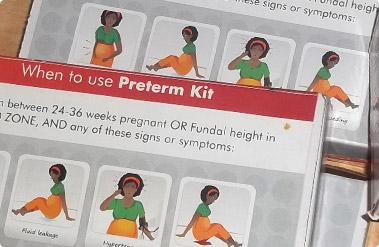
Antenatal Corticosteroids Trial (ACT)
The ACT study is a multi-site, randomized controlled trial to reduce neonatal mortality by improving identification of women at risk of preterm delivery and increasing the use of antenatal corticosteroids. A multi-faceted intervention among health care providers will be tested in six middle and low-income countries.
Read More
Primary Manuscript
Althabe F, Belizán JM, McClure EM, Hemingway-Foday J, Berrueta M, Mazzoni A, Ciganda A, Goudar SS, Kodkany BS, Mahantshetti NS, Dhaded SM, Katageri GM, Metgud MC, Joshi AM, Bellad MB, Honnungar NV, Derman RJ, Saleem S, Pasha O, Ali S, Hasnain F, Goldenberg RL, Esamai F, Nyongesa P, Ayunga S, Liechty EA, Garces AL, Figueroa L, Hambidge KM, Krebs NF, Patel A, Bhandarkar A, Waikar M, Hibberd PL, Chomba E, Carlo WA, Mwiche A, Chiwila M, Manasyan A, Pineda S, Meleth S, Thorsten V, Stolka K, Wallace DD, Koso-Thomas M, Jobe AH, Buekens PM. A population-based, multifaceted strategy to implement antenatal corticosteroid treatment versus standard care for the reduction of neonatal mortality due to preterm birth in low-income and middle-income countries: the ACT cluster-randomised trial. Lancet. 2015 Feb 14;385(9968):629-39. doi: 10.1016/S0140-6736(14)61651-2. Epub 2014 Oct 15. PMCID: PMC4420619 PMID: 25458726
Participating Institutions
- Tulane School of Public Health and Tropical Medicine
- JN Medical College, Belgaum, India
- Institute for Clinical Effectiveness and Health Policy (IECS), Buenos Aires, Argentina
- University of Alabama at Birmingham
- Aga Khan University, Karachi, Pakistan
- University Teaching Hospital, Lusaka, Zambia
- Massachusetts General Hospital
- University of Colorado Denver
- Lata Medical Research Foundation, Nagpur, India
- Instituto de Nutrición de Centro América y Panamá
- Christiana Care
- Moi University, Eldoret, Kenya
- RTI International
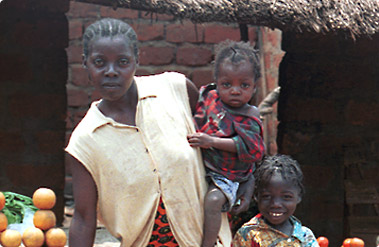
Safe Pregnancy Through Malaria Control in the Democratic Republic of Congo (DRC)
A study to assess the pharmacokinetics and pharmacodynamics of an orally-administered standard adult dose (200 mg) of artesunate, to determine if it is appropriate in parasitemic pregnant women when compared to the same women at three months postpartum and to parasitemic non-pregnant women.
Read More
Primary Manuscript
Onyamboko MA, Meshnick SR, Fleckenstein L, Koch MA, Atibu J, Lokomba V, Douoguih M, Hemingway-Foday J, Wesche D, Ryder RW, Bose C, Wright LL, Tshefu AK, Capparelli EVL, Koch M, Atibu J, Lokomba V, Douoguih M, Hemingway-Foday J, Wesche D, Ryder R, Bose C, Wright L, Tshefu A, Capparelli E. Pharmacokinetics and pharmacodynamics of artesunate and dihydroartemisinin following oral treatment in pregnant women with asymptomatic P. falciparum infections in Kinshasa DRC. Malar J. 2011 Feb;10:49. PMCID: PMC3056842 PMID: 21352601
Participating Institutions
- University of North Carolina at Chapel Hill School of Medicine
- Kinshasa School of Public Health, Democratic Republic of Congo
- RTI International

Antioxidant Therapy To Prevent Preeclampsia
A randomized, controlled trial testing whether the joint administration of the antioxidants vitamin C (1000mg) and vitamin E (400IU) would reduce the incidence of preeclampsia among chronically hypertensive pregnant patients and patients with a past history of preeclampsia/eclampsia.
Read More
Primary Manuscript
Spinnato JA , Freire S, Pinto E Silva JL, Rudge MVC, Martins-Costa S, Koch MA, Goco N, Santos CD, Cecatti JG, Costa R, Ramos JG, Moss N, Sibai BM. Antioxidant therapy to prevent preeclampsia: a randomized controlled trial. Obstet Gynecol. 2007;110(6):1311-18. PMID: 18055726
Participating Institutions
- University of Cincinnati
- University of Campinas, Brazil
- Universidade Federal de Pernambuco
- Hospital de ClÍnicas de Porto Alegre
- Faculdade de Medicina de Botucatu, UNESP, Botucatu, Brasil
- RTI International
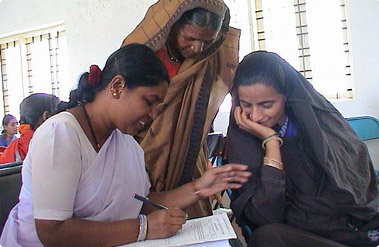
RCT of Misoprostol for Postpartum Hemorrhage in India
A randomized controlled trial to assess the prophylactic effectiveness of oral misoprostol administered in the community to women in the third stage of labor to reduce the incidence of acute postpartum hemorrhage.
Read More
Primary Manuscript
Derman R, Kodkany BS, Goudar SS, Geller SE, Naik VA, Bellad MB, Patted SS, Patel A, Edlavitch SA, Hartwell T, Chakraborty H, Moss N. Oral misoprostol in preventing postpartum haemorrhage in resource-poor communities: a randomised controlled trial. Lancet. 2006 Oct 7;368(9543):1248-53. PMID: 17027730
Participating Institutions
- University of Missouri at Kansas City
- JN Medical College, Karnataka, India
- RTI International

Zhi Byed Versus Misoprostol
A prospective, double-masked randomized study to determine the effect of prophylactic oral ZB11 administered at the beginning of the second stage of labor vs. prophylactic oral misoprostol administered in the third stage of labor, in reducing the incidence of acute PPH among Tibetan women giving birth in three hospitals in Lhasa, TAR.
Read More
Primary Manuscript
Miller S, Tudor C, Thorsten V, Nyima, Kalyang, Sonam, Lyakpen, Droyoung, Quzong K, Dekyi T, Hartwell T, Wright LL, Varner MW. Randomized double masked trial of Zhi Byed 11, a Tibetan traditional medicine, versus misoprostol to prevent postpartum hemorrhage in Lhasa, Tibet. J Midwifery Womens Health. 2009 Mar-Apr;54(2):133-141. PMCID: PMC2791828 PMID: 19249659
Participating Institutions
- University of Utah School of Medicine
- TAR Health Bureau, Lhasa
- RTI International

Tobacco Use
To determine the prevalence of tobacco use (smoking and smokeless tobacco), the Global Network, in collaboration with the National Cancer Institute, conducted a cross-sectional survey of knowledge, attitudes and behaviors regarding tobacco use among pregnant women in nine countries.
Read More
Primary Manuscript
Bloch M, Althabe F, Onyamboko M, Kaseba-Sata C, Castilla EE, Freire S, Garces A, Parida S, Goudar SS, Kadir MM, Goco N, Thornberry J, Daniels M, Bartz J, Hartwell T, Moss N, Goldenberg RL. Tobacco use and environmental tobacco smoke exposure during pregnancy: an investigative survey of women in nine developing nations. Am J Public Health. 2008 Oct;98(10):1833-40. PMCID: PMC2636473 PMID: 18309125
Participating Institutions
- University of North Carolina at Chapel Hill School of Medicine
- University of Colorado Denver
- Institute for Clinical Effectiveness and Health Policy (IECS), Buenos Aires, Argentina
- Instituto de Nutrición de Centro América y Panamá
- University of Alabama at Birmingham
- University of Maryland School of Medicine
- University Teaching Hospital, Lusaka, Zambia
- SCB Medical College, Orissa
- University of Iowa
- Christiana Care
- Estudio Colaborativo Latino Americano de Malformaciones Congenitas (ECLAMC)
- JN Medical College, Belgaum, India
- Aga Khan University, Karachi, Pakistan
- RTI International
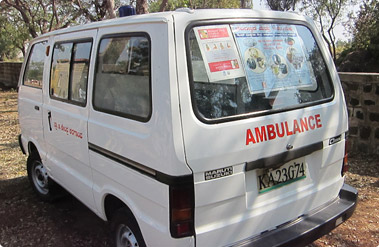
Emergency Obstetric and Neonatal Care (EmONC)
Three primary training components in the intervention clusters are:
- EmONC facility training to address the primary causes of maternal and perinatal mortality,
- community mobilization training to increase birth planning and transport, and
- Home-Based Life Saving Skills (HBLSS) to assist birth attendants in the identification and referral of complications during delivery.
The EmONC Study evaluated the ability of community teams, whose skills were enhanced through targeted community mobilization training programs, to explore the problems related to poor pregnancy outcomes and to improve the system of care for women and neonates. Flexibility was provided to the teams to develop solutions which fit their local needs. However, all sites performed training, service, and performance reviews; institutional and community death audits; emergency drills; and detailed data collection. The primary outcome was perinatal mortality, and the secondary outcomes included resuscitation, stillbirths, early neonatal deaths, maternal mortality, causes of neonatal death, and referral.
Primary Manuscript
Pasha O, McClure EM, Wright LL, Saleem S, Goudar SS, Chomba E, Patel A, Esamai F, Garces A, Althabe F, Kodkany B, Mabeya H, Manasyan A, Carlo WA,Derman RJ, Hibberd PL, Liechty EK, Krebs N, Hambidge KM, Buekens P, Moore J, Jobe AH, Koso-Thomas M, Wallace DD, Stalls S, Goldenberg RL; EMONCTrial Investigators. A combined community- and facility-based approach to improve pregnancy outcomes in low-resource settings: a Global Network cluster randomized trial. BMC Med. 2013 Oct 3;11:215. doi: 10.1186/1741-7015-11-215. PMCID:PMC3853358 PMID: 24090370
Participating Institutions
- Tulane School of Public Health and Tropical Medicine
- Christiana Care
- Institute for Clinical Effectiveness and Health Policy (IECS), Buenos Aires, Argentina
- JN Medical College, Belgaum, India
- University of Alabama at Birmingham
- Aga Khan University, Karachi, Pakistan
- University Teaching Hospital, Lusaka, Zambia
- Massachusetts General Hospital
- University of Colorado Denver
- Lata Medical Research Foundation, Nagpur, India
- Instituto de Nutrición de Centro América y Panamá
- Moi University, Eldoret, Kenya
- RTI International
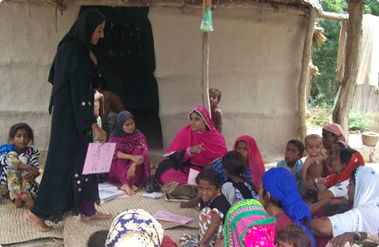
Birth Attendant Survey
Birth attendants were interviewed to assess training level, knowledge, skills, and access to medical equipment, and testing. The interaction of more than 100 home delivery attendants with their health care systems in 7 international sites in India, Pakistan, Guatemala, the Democratic Republic of the Congo, Kenya, and Zambia was also assessed. The study found that community birth attendants were often illiterate, could not read numbers, and had little formal training. They had limited skills and access to medications and equipment that are necessary to reduce maternal, fetal, or neonatal mortality.
Read More
In view of these findings, the provision of limited additional training to community birth attendants is unlikely to result in large scale improvements in pregnancy outcomes without significant investments in other components of the health care delivery system. The information provided by these data will be useful to health care providers and policy makers as they try to improve pregnancy outcomes in their regions, as well as for planning future Global Network research projects. Funding for this project was provided in part by the Bill and Melinda Gates Foundation through the MANDATE Project.
Primary Manuscript
Garces A, McClure EM, Chomba E, Patel A, Pasha O, Tshefu A, Esamai F, Goudar S, Lokangaka A, Hambidge KM, Wright LL, Koso-Thomas M, Bose C, Carlo WA, Liechty EA, Hibberd PL, Bucher S, Whitworth R, Goldenberg RL. Home birth attendants in low income countries: who are they and what do they do? - BMC Pregnancy Childbirth. 2012 May 14;12:34. doi: 10.1186/1471-2393-12-34. PMCID:PMC3493311 PMID: 22583622
Participating Institutions
- University of Alabama at Birmingham
- Aga Khan University, Karachi, Pakistan
- University Teaching Hospital, Lusaka, Zambia
- Massachusetts General Hospital
- University of Colorado Denver
- Lata Medical Research Foundation, Nagpur, India
- Instituto de Nutrición de Centro América y Panamá
- Christiana Care
- Moi University, Eldoret, Kenya
- JN Medical College, Belgaum, India
- RTI International

Tape for Assessing Gestational Age
Development and validation of a fundal height color-coded Tape for Assessing Gestational Age was conducted in 2 phases. First, an observational study was conducted to design a tape for fundal height measurement, which corresponds to a growth chart to identify pre-term pregnancies between 24 and 38 weeks. Three color-coded tapes, using region-specific upper and lower values of preterm gestational age were then designed and tested for the validity of identifying preterm pregnancies between 24-36 weeks of gestational age in Pakistan, India and Argentina. The tape is being used to identify women with unknown gestational ages who are eligible for the receipt of corticosteroids in ACT. A manuscript is in preparation.
Read More
Primary Manuscript
Althabe F, Berrueta MB, Hemingway-Foday JJ, Mazzoni A, Bonorino CA, Gowdak A, Gibbons L, Bellad MB, Metgud MC, Goudar SS, Kodkany BS, Derman RJ, Saleem S, Iqbal S, Ala SH, Goldenberg RL, Chomba E, Manasyan A, Chiwila M, Imenda E, Mbewe F, Tshefu AK, Lokomba V, Bose CL, Moore JL, Meleth S, McClure EM, Koso-Thomas M, Buekens PM, Belizán JM. A color-coded tape for uterine height measurement: a tool to identify preterm pregnancies in low resource settings. PloS one. 2015 ; 10(3): e0117134. PubMed Central: PMC4379082 PMID: 25822529
Participating Institutions
- University of Alabama at Birmingham
- JN Medical College, Belgaum, India
- University Teaching Hospital, Lusaka, Zambia
- Aga Khan University, Karachi, Pakistan
- Christiana Care
- RTI International

Verbal Autopsy
The verbal autopsy study examined cause of death (COD) for community-based perinatal deaths using a VA tool; COD assigned by non-physicians was comparable to physicians.
Read More
Primary Manuscript
Engmann C, Garces A, Jehan I, Ditekemena J, Phiri M, Thorsten V, Mazariegos M, Chomba E, Pasha O, Tshefu A, Wallace D, McClure EM, Goldenberg RL, Carlo WA, Wright L, Bose C. Birth attendants as perinatal verbal autopsy respondents in low-income countries: A viable alternative? Bull World Health Organ. 2012 Mar 1;90(3):200-8. PMCID: PMC3314200 PMID: 22461715
Participating Institutions
- University of North Carolina at Chapel Hill
- University Teaching Hospital, Lusaka, Zambia
- Kinshasa School of Public Health, Kinshasa, DRC
- University of Colorado Denver
- University of Alabama at Birmingham
- Instituto de Nutrición de Centro América y Panamá
- Aga Khan University, Karachi, Pakistan
- RTI International

First Look
Obstetric ultrasound is part of current antenatal care in high-resource settings and used to identify complications of pregnancy as well as to establish accurate gestational age. Ultrasound is increasingly being disseminated in low-resource settings due lower costs and increased durability of the equipment but its impact on maternal and newborn mortality in these settings has not been assessed.
Read More
The use of compact ultrasound by physician and non-physician health care staff for antenatal identification of high risk pregnancies is a potentially effective intervention and authoritative investigations are needed in low-resource settings to establish its potential impact. This multi-country cluster randomized trial will assess the impact of antenatal ultrasound screening performed by community physician and non-physician health care staff in low-resource community settings. With the support of the Bill and Melinda Gates Foundation, National Institute for Child and Human Development, GE Healthcare and University of Washington we will maximize the resources necessary to conduct the definitive trial on the potential impact of ultrasound to reduce maternal and newborn mortality and maternal morbidity in low-resource settings.
Primary Manuscript
R L Goldenberg, R O Nathan, D Swanson, S Saleem, W Mirza, F Esamai, D Muyodi, A L Garces, L Figueroa, E Chomba, M Chiwala, M Mwenechanya, A Tshefu, A Lokangako, V L Bolamba, J L Moore, H Franklin, J Swanson, E A Liechty, C L Bose, N F Krebs, K Michael Hambidge, W A Carlo, N Kanaiza, F Naqvi, I S Pineda, W López-Gomez, D Hamsumonde, M S Harrison, M Koso-Thomas, M Miodovnik, D D Wallace, E M McClure
Routine antenatal ultrasound in low- and middle-income countries: first look - a cluster randomised trial
BJOG. 2018 Nov;125(12):1591-1599. PMCID: PMC6390492 PMID: 29782696
Participating Institutions
- University of Alabama at Birmingham
- JN Medical College, Belgaum, India
- University Teaching Hospital, Lusaka, Zambia
- University of Colorado Denver
- Aga Khan University, Karachi, Pakistan
- Instituto de Nutrición de Centro América y Panamá
- Christiana Care
- Moi University, Eldoret, Kenya
- RTI International
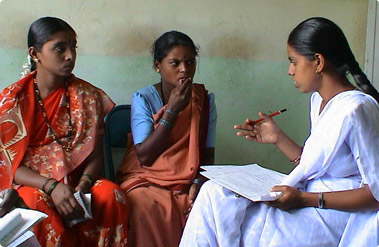
Women First
A study to test whether a nutrition intervention commencing at least 3 months before conception, will be associated with a greater newborn length compared to offspring whose mothers receive the same intervention at 12 weeks gestation or not at all.
Read More
Attention is increasingly directed to the role of maternal nutrition during the 1st trimester for normal growth and development during the first thousand days, from conception to the child's second birthday. The primary hypothesis of the Women First: Preconception Maternal Nutrition study is that for women in poor communities, a comprehensive maternal nutrition intervention commencing at least 3 months prior to conception and continuing throughout pregnancy, will be associated with a significantly greater newborn length than for offspring whose mothers start to receive the same intervention at 12 weeks gestation or who do not receive the intervention at all. The results of this trial will make a major contribution to refining evidence-based strategies for maternal nutrition supplementation and evaluating the cost-benefits of extending such strategies beyond pregnancy to virtually all women of child-bearing age, including adolescent girls.
Primary Manuscript
K Michael Hambidge, Jamie E Westcott, Ana Garcés, Lester Figueroa, Shivaprasad S Goudar, Sangappa M Dhaded, Omrana Pasha, Sumera A Ali, Antoinette Tshefu, Adrien Lokangaka, Richard J Derman, Robert L Goldenberg, Carl L Bose, Melissa Bauserman, Marion Koso-Thomas, Vanessa R Thorsten, Amaanti Sridhar, Kristen Stolka, Abhik Das, Elizabeth M McClure, Nancy F Krebs, Women First Preconception Trial Study Group
A multicountry randomized controlled trial of comprehensive maternal nutrition supplementation initiated before conception: the Women First trial
Am J Clin Nutr. 2019 Feb 1;109(2):457-469. PMCID: PMC6367966 PMID: 30721941
Participating Institutions
- University of Colorado Denver
- Instituto de Nutrición de Centro América y Panamá
- Christiana Care
- JN Medical College, Belgaum, India
- Columbia University
- Aga Khan University, Karachi, Pakistan
- University of North Carolina at Chapel Hill
- Kinshasa School of Public Health, Democratic Republic of Congo
- RTI International
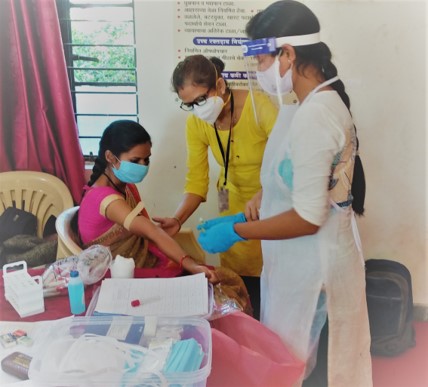
MNHR COVID-19 Sub-Study
The MNHR COVID study will determine the prevalence of COVID-19 antibodies in pregnant /recently delivered women in 8 Global Network sites (in DRC, Kenya, Zambia, Bangladesh, India [2 sites], Pakistan and Guatemala) and its association with maternal, fetal and neonatal outcomes. Additionally, we aim to explore knowledge, attitudes and prevention practices regarding COVID-19 during pregnancy.
Read More
Over a 24-month period, approximately 170 women per month from each site will be asked to complete a questionnaire and provide a blood sample at or near delivery, which will be tested for COVID-19 antibodies; quality control will be provided by RTI. Through the data that are routinely collected by the Global Network’s Maternal Newborn Health Registry (MNHR), we will evaluate fetal, neonatal, and maternal outcomes.
This study will help to understand the extent of the infection in the population, and the unknown impact of both symptomatic and asymptomatic infection on the pregnancy outcomes, and provide answers to questions related to COVID-19 infection in pregnant women especially from LMICs where access to authentic information is limited. The Global Network’s COVID-19 study will be an important contribution to the understanding of the prevalence of COVID-19 among pregnant women as well as the association between COVID-19 and pregnancy outcomes in LMICs.
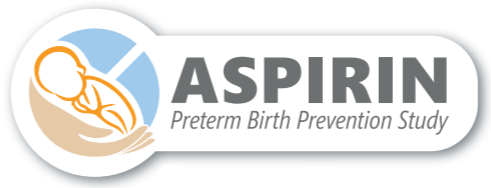
Aspirin
Preterm birth (PTB) remains the leading cause of neonatal mortality and long term disability throughout the developed and developing world. A growing body of evidence suggests that 1st trimester administration of low dose aspirin can reduce the rate of PTB substantially. This prospective, randomized, placebo-controlled, double-blinded, multi-center clinical trial will examine whether low dose aspirin initiated between 6 0/7 weeks- 12 6/7 weeks gestation reduces the risk of PTB.
Read More
Primary Manuscript
Matthew K Hoffman 1, Shivaprasad S Goudar 2, Bhalachandra S Kodkany 2, Mrityunjay Metgud 2, Manjunath Somannavar 2, Jean Okitawutshu 3, Adrien Lokangaka 3, Antoinette Tshefu 3, Carl L Bose 4, Abigail Mwapule 5, Musaku Mwenechanya 5, Elwyn Chomba 5, Waldemar A Carlo 6, Javier Chicuy 7, Lester Figueroa 7, Ana Garces 7, Nancy F Krebs 8, Saleem Jessani 9, Farnaz Zehra 9, Sarah Saleem 9, Robert L Goldenberg 10, Kunal Kurhe 11, Prabir Das 11, Archana Patel 11, Patricia L Hibberd 12, Emmah Achieng 13, Paul Nyongesa 13, Fabian Esamai 13, Edward A Liechty 14, Norman Goco 15, Jennifer Hemingway-Foday 15, Janet Moore 15, Tracy L Nolen 15, Elizabeth M McClure 15, Marion Koso-Thomas 16, Menachem Miodovnik 16, R Silver 17, Richard J Derman 18, ASPIRIN Study Group
Low-dose aspirin for the prevention of preterm delivery in nulliparous women with a singleton pregnancy (ASPIRIN): a randomised, double-blind, placebo-controlled trial
Lancet. 2020 Jan 25;395(10220):285-293. PMCID: PMC7168353 PMID: 31982074
Participating Institutions
- University of Alabama at Birmingham
- Jawaharlal Nehru Medical College, Belagavi, India
- University Teaching Hospital, Lusaka, Zambia
- University of Colorado Denver
- Aga Khan University, Karachi, Pakistan
- Columbia University, New York, New York
- Instituto de Nutrición de Centro América y Panamá, Guatemala City, Guatemala
- Christiana Care
- Moi University, Eldoret, Kenya
- Indiana University, Indianapolis, Indiana
- Kinshasa School of Public Health, Kinshasa, Democratic Republic of Congo
- University of North Carolina at Chapel Hill
- Lata Medical Research Foundation, Nagpur, India
- Boston University School of Public Health, Boston, Massachusetts
- RTI International
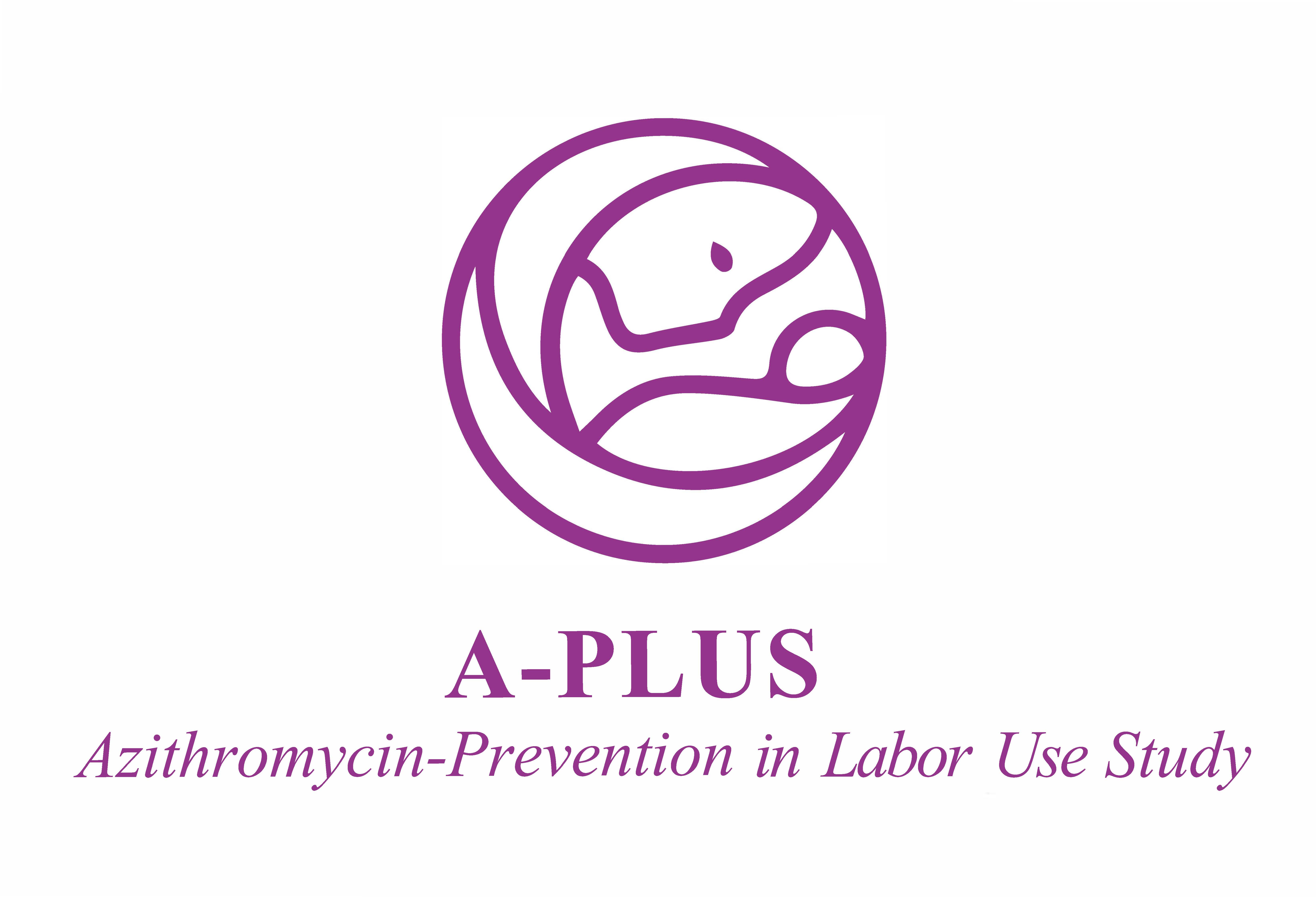
A-PLUS
Current Research: A randomized, placebo-controlled, parallel multicenter clinic trial to assess whether a single, prophylactic intrapartum oral dose of 2g azithromycin given to women in labor will reduce (1) maternal death or sepsis and (2) intrapartum/neonatal death or sepsis.
Read MoreMaternal and neonatal infections are among the most frequent causes of maternal and neonatal deaths, and current antibiotic strategies have not been effective in preventing many of these deaths. There is evidence that treatment with an oral dose of 2 g azithromycin vs. placebo for women in labor reduced certain maternal and neonatal infections. However, it is unknown if this therapy reduces maternal and neonatal sepsis and mortality. The A-PLUS Trial (Azithromycin-Prevention in Labor Use Study) will assess the effect of a single oral 2 g dose of azithromycin given to women in labor on the prevention of maternal and neonatal deaths and infection. The trial will enroll 34,000 pregnant women at eight research sites in Latin America, South Asia, and sub-Saharan Africa who are in labor, ≥28 weeks gestational age with a live fetus pregnancy, and plan to deliver vaginally in a facility. The trial includes two primary hypotheses: (1) a single, prophylactic intrapartum oral dose of 2 g azithromycin given to women in labor will reduce maternal death or sepsis; (2) a single, prophylactic intrapartum oral dose of 2 g azithromycin given to women in labor will reduce intrapartum/neonatal death or sepsis. There will also be a sub-study to assess the effect of the intervention on antimicrobial resistance and microbiome diversity.
Primary Manuscript
Tita ATN, Carlo WA, McClure EM, Mwenechanya M, Chomba E, Hemingway-Foday JJ, Kavi A, Metgud MC, Goudar SS, Derman R, Lokangaka A, Tshefu A, Bauserman M, Bose C, Shivkumar P, Waikar M, Patel A, Hibberd PL, Nyongesa P, Esamai F, Ekhaguere OA, Bucher S, Jessani S, Tikmani SS, Saleem S, Goldenberg RL, Billah SM, Lennox R, Haque R, Petri W, Figueroa L, Mazariegos M, Krebs NF, Moore JL, Nolen TL, Koso-Thomas M; A-PLUS Trial Group. Azithromycin to Prevent Sepsis or Death in Women Planning a Vaginal Birth. N Engl J Med. 2023 Mar 30;388(13):1161-1170. doi: 10.1056/NEJMoa2212111. Epub 2023 Feb 9. PMCID: PMC10627427; PMID: 36757318.
Perinatal Infections in Pakistan
There are large differences in health outcomes related to pregnancy and birth between developed and developing countries. This study will investigate how infections, medical history, health care behavior and psychosocial issues are associated with pregnancy outcomes in Pakistan.
Read MoreClinicalTrials.Gov ID: NCT00070746
Survey Tool for Screening of Anemia in Women Before Pregnancy (PREPSA)
The goal of this observational and cross-sectional study is to develop and validate a survey that can be used to identify anemia, and its severity, among pre-pregnant women allowing for the timely implementation of focused public health and personalized interventions.
Participants will be asked 26 survey questions about menstrual history and provide a 5 ml venous blood sample to measure hemoglobin, ferritin, and transferrin saturation levels.
Read MoreClinicalTrials.Gov ID: NCT05832840
Sildenafil Citrate to Improve Maternal and Neonatal Outcomes in Low-resource Settings (PRISM)
The PRISM pilot feasibility study consists of two phases to determine: 1) to delivery practices, rates of primary and secondary outcomes, and feasibility of enrollment rates, and 2) to assess the feasibility and acceptability of the intervention and expected enrollment rates, and estimate the effect size of sildenafil citrate on maternal and neonatal outcomes in a low resource settings in preparation for the main RCT.
Read MoreClinicalTrials.Gov ID: NCT05946681
Newborn and Child Studies
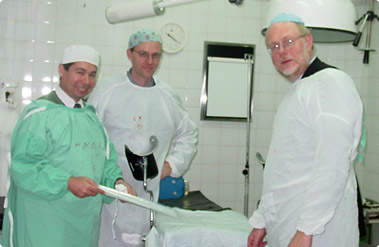
Clustered Trial for Improving Perinatal Care in Uruguay/Argentina
A cluster randomized controlled trial of a behavioral intervention in Argentina and Uruguay that will increase the use of two evidence-based birth practices (EBP), the selective use of episiotomies and active management of the third stage of labor.
Read More
Primary Manuscript
Althabe FA, Buekens P, Bergel E, BelizaÌn JM, Campbell MK, Moss N, Hartwell T, Wright LL. A behavioral intervention to improve obstetrical care. New Engl J Med. 2008 May 1;358(18):1929-40. PMID: 18450604.
Participating Institutions
- Tulane School of Public Health and Tropical Medicine
- Institute for Clinical Effectiveness and Health Policy (IECS), Buenos Aires, Argentina
- RTI International
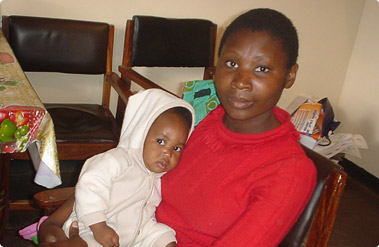
Neonatal Resuscitation in Zambia
To test training staff in the Neonatal Resuscitation Program and the WHO integrated Management of Pregnancy and Childbirth: Pregnancy, Childbirth, Postpartum and Newborn Care Guide for Essential Practice (2003): Essential Newborn Care Program (ENC) compared to training staff in the ENC alone will reduce neonatal mortality or stillbirth (7 days).
Read More
Primary Manuscript
Carlo WA, McClure EM, Chomba E, Chakraborty H, Hartwell T, Harris H, Lincetto O, Wright LL. Newborn care training of midwives and neonatal and perinatal mortality rates in a developing country. Pediatrics. 2010 Nov;126(5):e1064-71. doi: 10.1542/peds.2009-3464. PMID: 20937659.
Participating Institutions
- University of Alabama at Birmingham
- University Teaching Hospital, Lusaka
- RTI International
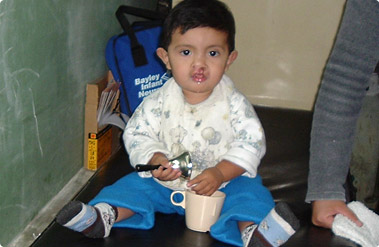
Systematic Pediatric Care for Oral Clefts
Study of an intensive pediatric care intervention designed to reduce neonatal mortality of children born with oral clefts and to follow a subset of these who have been randomized into normal or more intensive pediatric care through two years.
Read More
Primary Manuscript
Wehby GL, Castilla EE, Goco N, Rittler M, Cosentino V, Javois L, Kindem M, Chakraborty H, Dutra G, López-Camelo JS, Orioli IM, Murray JC. The effect of systematic pediatric care on neonatal mortality and hospitalizations of infants born with oral clefts. BMC Pediatr. 2011 Dec 28;11:121. PMCID: PMC3277464; PMID: 22204448.
Participating Institutions
- University of Iowa
- Estudio Colaborativo Latino Americano de Malformaciones Congenitas (ECLAMC)
- RTI International

Randomized Placebo-Controlled Trial (RPCT) of Maize/Zinc in Guatemala
A randomized controlled trial comparing zinc supplementation to complementary feeding in infants between 6-12 months of age.
Read More
Primary Manuscript
Krebs NF, Mazariegos M, Tshefu A, Bose C, Sami N, Chomba E, Carlo W, Goco N, Kindem M, Wright LL, Hambidge KM; Complementary Feeding Study Group. Meat consumption is associated with less stunting among toddlers in four diverse low-income settings. Food Nutr Bull. 2011 Sep;32(3):185-91. PMCID:PMC3918945; PMID: 22073791.
Participating Institutions
- University of Colorado
- Center for Studies of Sensory Impairment, Aging and Metabolism (CeSSIAM)
- RTI International
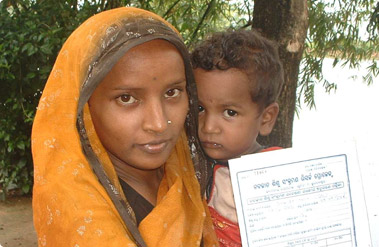
Prevention of Infection in Indian Neonates
A study of the colonization ability of a probiotic supplement (Lactobacillus plantarum) in the infant gut.
Read More
Primary Manuscript
Panigrahi P, Parida S, Pradhan L, Mohapatra SS, Misra PR, Johnson JA, Chaudhry R, Taylor S, Hansen NI, Gewolb IH. Long-term colonization of a Lactobacillus plantarum synbiotic preparation in the neonatal gut. J Pediatr Gastroenterol Nutr. 2008 Jul;47(1):45-53. PMID: 18607268.
Participating Institutions
- University of Maryland School of Medicine
- SCB Medical College, Orissa
- RTI International
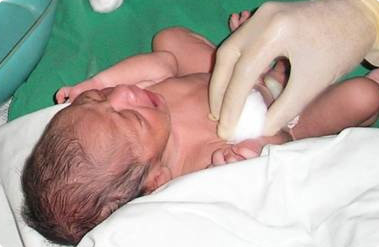
A Randomized trial of chlorhexidine vaginal and infant wipes to reduce perinatal mortality and morbidity
A randomized controlled trial to determine the efficacy of a vaginal/neonatal wash to reduce 28-day neonatal and maternal morbidity and mortality.
Read More
Primary Manuscript
Saleem S, Rouse DJ, McClure EM, Reza T, Yahya Y, Memon IA, Khan NH, Memon G, Soomro N, Pasha O, Wright L, Moore J, Goldenberg RL. A Randomized trial of chlorhexidine vaginal and infant wipes to reduce perinatal mortality and morbidity. Am J Ob Gyn. 2010 Jun;115(6):1225-32. PMCID:PMC3893917; PMID: 20502294.
Participating Institutions
- University of Alabama at Birmingham
- Aga Khan University, Karachi
- RTI International
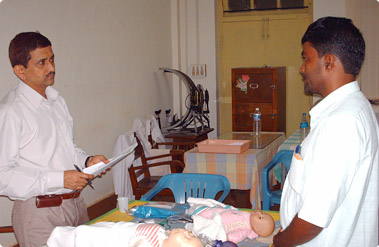
First Breath
Almost 4,000 birth attendants from 100 GN communities with more than 150,000 deliveries were trained in neonatal care and resuscitation, using the WHO Essential Newborn Care training program, followed by randomization to the Neonatal Resuscitation Program. The trial significantly reduced perinatal deaths. As many as 30 to 40% of perinatal deaths may be averted with this simple intervention which led to the development of Helping Babies Breathe.
Read More
Primary Manuscript
Carlo WA, Goudar SS, Jehan I, Chomba E, Tshefu A, Garces A, Parida S, Althabe F, McClure EM, Derman RJ, Goldenberg RL, Bose C, Krebs NF, Panigrahi P, Buekens P, Chakraborty H, Hartwell TD, Wright LL. Newborn care training and perinatal mortality in developing countries. N Engl J Med. 2010 Feb 18;362(7):614-23. PMCID: PMC3565382 PMID 20164485
Participating Institutions
- Tulane School of Public Health and Tropical Medicine
- JN Medical College, Belgaum, India
- Institute for Clinical Effectiveness and Health Policy (IECS), Buenos Aires, Argentina
- University of Alabama at Birmingham
- Aga Khan University, Karachi, Pakistan
- University Teaching Hospital, Lusaka, Zambia
- Massachusetts General Hospital
- University of Colorado Denver
- Lata Medical Research Foundation, Nagpur, India
- Instituto de Nutrición de Centro América y Panamá
- Kinshasa School of Public Health, Democratic Republic of Congo
- Christiana Care
- Moi University, Eldoret, Kenya
- RTI International
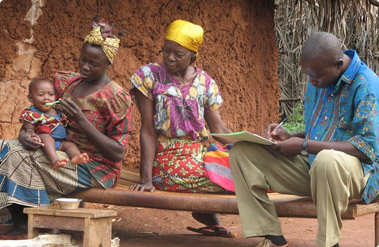
Complementary Feeding (FIRST BITES)
The primary outcome measure was linear growth velocity; secondary outcomes were neurocognitive development, infectious disease morbidity, dietary diversity, and micronutrient status. The trial was conducted in 4 of the 7 Global Network sites (Guatemala, Pakistan, Zambia, and the Democratic Republic of the Congo).
Read More
The trial began in July 2008; the primary paper demonstrated that the linear growth velocity of infants that received multiply enriched cereal was similar to those that received meat as a complementary feeding.
Primary Manuscript
Krebs NF, Hambidge M, Mazariegos M, Westcott J, Goco N, Wright LL, Koso-Thomas M, Tshefu A, Bose C, Pasha O, Goldenberg RL, Chomba E, Carlo WA, Kindem M, Das A, Hartwell TD, McClure EM. Complementary feeding: A Global Network cluster randomized controlled trial. BMC Pediatr. 2011 Jan 13;11(1):4. PMCID: PMC3032692; PMID: 21232139.
Participating Institutions
- University of North Carolina at Chapel Hill School of Medicine
- University Teaching Hospital, Lusaka, Zambia
- Kinshasa School of Public Health, Democratic Republic of Congo
- University of Colorado Denver
- University of Alabama at Birmingham
- Instituto de Nutrición de Centro América y Panamá
- Aga Khan University, Karachi, Pakistan
- RTI International
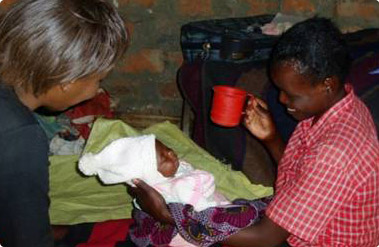
BRAIN
The BRAIN study is a recently completed randomized trial to evaluate the impact of a home-based, parent-provided early intervention on the neurodevelopmental outcome of infants who were resuscitated for mild to moderate asphyxia in the FIRST BREATH trial in Zambia, Pakistan, and Belgaum, India. All infants received case management and growth monitoring. Trained, certified staff masked to the infants' history conducted the neurodevelopmental testing, which was adapted for use in the relevant cultural context.
Read More
The early developmental intervention started soon after birth and continued until three years of age. Survivors of mild or moderate birth asphyxia had neurodevelopmental outcomes in the normal range: their MDI and PDI scores improved by an average of 5 points in the early intervention group compared to the case management control group. The trial demonstrated that home-based, parent provided early intervention in children resuscitated at birth improved cognitive and psychomotor outcomes. Neurodevelopmental outcomes among asphyxiated infants were similar to those of non-asphyxiated infants and documented that the intervention benefitted children at low-risk for neurodevelopmental difficulties: (J Pediatr, in press). Neurodevelopmental assessment expertise developed for this trial may provide a resource for ICs and NGOs who are working in interventions to improve neurodevelopmental outcome in the participating countries.
Primary Manuscript
Carlo WA, Goudar SS, Pasha O, Chomba E, Wallander JL, Biasini FJ, McClure EM, Thorsten V, Chakraborty H, Shearer DL, Wright LL, and the BRAIN-HIT Committee and the NICHD Global Network for Women's and Children's Health Research Investigators. Randomized trial of early developmental intervention in children after birth asphyxia in developing countries.: J Pediatr. 2013 Apr;162(4):705-712.e3. doi: 10.1016/j.jpeds.2012.09.052. Epub 2012 Nov 16. PMCID:PMC3582821; PMID: 23164311.
Participating Institutions
- University of Alabama at Birmingham
- JN Medical College, Belgaum, India
- University Teaching Hospital, Lusaka, Zambia
- Aga Khan University, Karachi, Pakistan
- Christiana Care
- RTI International
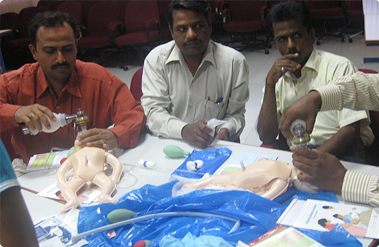
Helping Babies Breathe (HBB)
The HBB initiative represents a further development of the Global Network FIRST BREATH trial, which was designed to provide skilled birth attendants to babies wherever they are born. HBB is being rolled out globally by the Global Network, the American Academy of Pediatrics, USAID and its partners, Saving Newborn Lives, Laerdal, Inc. It was field tested in 5 sites, 2 of which were Global Network sites in Kenya and Belgaum, India, and includes the development of a new low-cost neonatal simulator and resuscitation bag.
Read More
USAID requested that the Global Network evaluate the impact of Helping Babies Breathe on neonatal survival which is underway in 3 Global Network sites in Kenya, and Nagpur and Belgaum, India. USAID will conduct the programmatic evaluation for 4 sites. The GN HBB pre-post study has an important public health goal: to demonstrate whether HBB training of birth attendants (BAs) in 71 participating facilities that deliver many pregnant women living in GN communities will improve the outcome of all neonates delivered in the GN clusters in a 1-yr pre-post study. Teams of HBB Master Trainers (MDs and RNs), paired with core master trainers from Nagpur, Belgaum, and Kenya trained a large cohort of site Master Trainers in May, 2012, in order to scale up HBB expertise in 4 months. Subsequently 1,636 birth attendants have been trained in HBB at the 71 participating facilities and strong QI program implemented in the facilities.
Primary Manuscript
Bellad RM, Bang A, Carlo WA, McClure EM, Meleth S, Goco N, Goudar SS, Derman RJ, Hibberd PL, Patel A, Esamai F, Bucher S, Gisore P, Wright LL, HBB Study Group. A pre-post study of a multi-country scale up of resuscitation training of facility birth attendants: does Helping Babies Breathe training save lives? EMC pregnancy and childbirth. 2016 Aug; 16(1): 222. PMC5477802; PMID: 27527831.
Participating Institutions
- Christiana Care
- JN Medical College, Belgaum, India
- Massachusetts General Hospital
- Moi University, Eldoret, Kenya
- RTI International

Aspirin Neurodevelopment Follow-Up
A total of 620 children were enrolled in this study from six sites in sub-Saharan Africa, South Asia, and Latin America. Half of the children's mothers will have taken aspirin and half will have taken placebo. This will allow the researchers to compare results of the two groups of children and determine if children exposed antenatally to low dose aspirin will have no significant difference in neurodevelopmental behavior than those of their peers.
Read More
Preterm birth (PTB) remains the leading cause of neonatal mortality and long-term disability throughout the developed and developing world. A growing body of evidence suggests that 1st trimester administration of low dose aspirin can reduce the rate of PTB substantially. The Global Network developed and completed a randomized multi-center clinical trial to examine whether administration of aspirin between 6-12 weeks of pregnancy would reduce the risk of a pre-term birth(s). The ASPFU (ASPIRIN Neurodevelopment Follow-Up) study will examine the long-term neurodevelopment effects of aspirin in toddlers born from the ASPIRIN study (ClinicalTrials.gov).
ClinicalTrials.Gov ID: NCT04888377